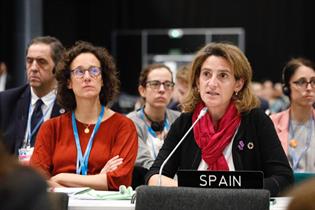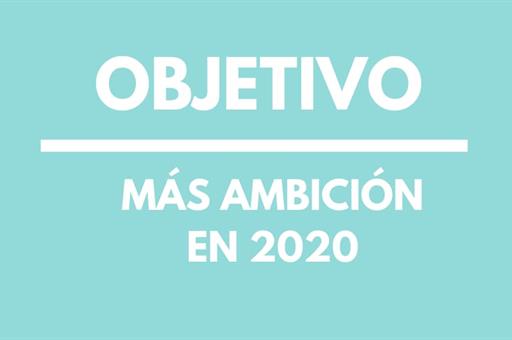Conclusion of Climate Conference
COP25 lays the foundations for countries to be more ambitious in response to climate emergency
News - 2019.12.15
Madrid
It declared the "urgent need" for these new commitments by countries to bridge the existing gap in present commitments regarding the goal of the Paris Agreement to avoid a temperature rise of more than 1.5 degrees.
The Final Decision was possible thanks to an intense day's negotiations and after the Chilean Presidency of the COP nominated the Acting Minister for Ecological Transition, Teresa Ribera, to facilitate the three key points of the negotiation: greater ambition, the Mechanism for Loss and Damage associated with climate change, and financing, in the early morning of Sunday, 15 December.
"Chile-Madrid Time for Action" calls for this process to activate ambition, which begins in just 15 days, to be in line with scientific evidence and with what young people in the streets are demanding
Countries must present their climate commitments (NDC) before the next Climate Conference in Glasgow, so that the United Nations can draw up a Summary Report prior to the COP26 which shows where we are regarding the goal of the Paris Agreement to maintain the planet's temperature increase to below 1.5ºC.
"The mandate is clear: countries must present more ambitious nationally determined contributions than those at present in 2020; it is important to respond to people's demands and those of science and undertake to do more, and to do it and more quickly", remarked the Acting Minister for Ecological Transition, Teresa Ribera.
Boost to action by non-governmental parties
 Ministerio para la Transición EcológicaThe Final Decision adopted by the close on 200 countries that make up the UN Climate Convention recognises the importance of climate action by non-governmental parties, and invites them to step up their action in the fight against climate change and to implement universal strategies that are compatible with climate.
Ministerio para la Transición EcológicaThe Final Decision adopted by the close on 200 countries that make up the UN Climate Convention recognises the importance of climate action by non-governmental parties, and invites them to step up their action in the fight against climate change and to implement universal strategies that are compatible with climate.
Held within a previously agreed framework of governance (the Paris Agreement and its Rulebook), the COP25 has been the first Climate Conference of a new cycle in which the key is implementation; in other words, that all parties do more and do it more quickly, as reflected in the Final Decision approved.
"This document is the basis for our imminent actions. Now is the time for action", underlined Teresa Ribera upon the conclusion of the meeting. "The COPs are no longer simply a forum for making rules; the new phase that has begun here in Madrid requires more action and more parties involved", she added.
"The result of the Conference reflects that what we sought with the Paris Agreement is now taking place: different sectors are moving to take action. A good number of them have come to show why they want to get involved in the decarbonisation process, form part of it and ensure that it goes faster", highlighted the acting minister.
The COP25 also confirmed that the fight against climate change is a cross-cutting issue, and sector ministers from around the world have made it clear in Madrid, that they will take on the climate agenda in their own respective areas of competence.
Over these two weeks, there have been high-level meetings in the fields of finance, science, industry, energy, transport, forestry and agriculture, among others.
Furthermore, countries undertake to work on the design of market mechanisms at the next COP that avoid double accounting, and serve to bolster the ambition of the Paris Agreement and which guarantee the environmental integrity of the system.
Mechanism of Loss and Damage
 Ministerio para la Transición EcológicaThe countries agreed to establish some guidelines for the Green Fund so that it extends its scope of financing and, as well as being allocated to mitigation and adaptation, allocate resources for the first time to the losses and damages suffered by the most vulnerable countries affected by the impacts of extreme climate phenomena. Furthermore, the Santiago Network has been set up to allow technical assistance to be catalysed from organisations and experts to these vulnerable countries, thus improving their ability to respond to the effects of global warming.
Ministerio para la Transición EcológicaThe countries agreed to establish some guidelines for the Green Fund so that it extends its scope of financing and, as well as being allocated to mitigation and adaptation, allocate resources for the first time to the losses and damages suffered by the most vulnerable countries affected by the impacts of extreme climate phenomena. Furthermore, the Santiago Network has been set up to allow technical assistance to be catalysed from organisations and experts to these vulnerable countries, thus improving their ability to respond to the effects of global warming.
This was one of the questions most demanded by the small island States that most directly suffer from the severest impacts of climate change.
Gender Plan
The negotiators at COP25 agreed to a new Gender Action Plan that will allow measures to be developed to offer a response to the unequal effect of climate change on women and girls, and to promote their role as agents of change in this process towards an emission-free world.
This new Plan, which will be in force until the year 2025 - when it will be revised - seeks to ensure greater participation from women in international negotiations, and guarantee them an active role in decision making at a national level.
Renewed support for multilateralism and science
Despite the obstacles, multilateralism and science have prevailed at the COP25, and the Final Decision states that scientific knowledge is the main cornerstone that should guide decisions regarding climate change and the enhanced ambition of countries and the other sectors.
It recognises that climate action must be continuously updated based on scientific developments, as well as the role of the Inter-governmental Panel of Experts on Climate Change (IPCC) in providing countries with further knowledge so that they can strengthen their capacity to respond to the climate emergency, and welcomes the two special reports published in 2019 on the use of land and oceans.
"The COP25 is a reaffirmation of the value of multilateralism and of international cooperation in resolving a global challenge such as climate change", remarked the minister. "Even in complex global contexts, the COP25 has not betrayed the climate agenda at a fundamental time for the implementation of the Paris Agreement. On the contrary, it has highlighted active multilateralism", she added.
Leading role of social dimension
 Ministerio para la Transición EcológicaThe social dimension of the climate agenda played a leading role at this COP25 for the first time. The talks in Madrid reflected on the fact that people, their concerns and their future should be at the heart of the response to the climate crisis. And that tackling this challenge also means moving towards a model of prosperity based on inclusion and fairness.
Ministerio para la Transición EcológicaThe social dimension of the climate agenda played a leading role at this COP25 for the first time. The talks in Madrid reflected on the fact that people, their concerns and their future should be at the heart of the response to the climate crisis. And that tackling this challenge also means moving towards a model of prosperity based on inclusion and fairness.
The text contains the "imperative" that the transition towards an emission-free world must be just, and drive the creation of decent, quality jobs.
"You cannot have decarbonisation policies without climate justice, without inter-generational justice and without justice within each generation: women and girls, vulnerable workers and consumers or people who live in places that will be harshly affected by global warming", she stated.
Oceans and land use
In response to the special reports published by the IPCC in 2019, the Climate Convention will hold a forum for dialogue on oceans and another for land use at its meeting in June 2020. The text underlines the role of solutions based on nature to help meet the goal of keeping within a 1.5ºC temperature increase and of the need to address the loss of bio-diversity and the fight against climate change from a comprehensive perspective.
Some milestones in climate action at the COP25
- The EU has managed, in the fewer than 15 days since the new European Commission was formed, to activate a raft of ambitious measures to tackle the climate emergency, through its Green New Deal; to commit to climate neutrality by 2050 and convert the European Investment Bank (EIB) into the "Climate Bank", which will allow one trillion euros in investment to be released over the next 10 years. The EIB also announced that it will stop financing projects associated with fossil fuels by 2021.
- Some 20 Spanish banks, some of which have a major global presence, agree to align themselves with the Paris Agreement.
- The Coalition of Finance Ministers for Climate Action, made up of 51 countries, including Spain, has signed the Santiago Action Plan, which undertakes to introduce climate change in its economic and financial policies with zero or low growth in emissions.
- The Inter-American Development Bank announced the creation of a Network of Central and Supervisory Banks - an international platform to attain a green financial system at a global level.
- The Adaptation Fund managed to mobilise a total of 89 million dollars from a number of countries during this COP, including Spain.
- The number of investment funds doubled at this COP that undertook to ensure that their portfolios are emission-free as soon as possible, rising from portfolios managing 2.4 trillion dollars at the Climate Conference in New York, to 4 trillion at the COP25.
- The number of multinationals committed to being carbon neutral by 2050 has doubled, from 90 at the Climate Conference in New York, to 177 at the COP25. These companies employ more than 5.8 million people.
- The figure for large cities committed to climate neutrality by 2050 has risen from 100 at the Climate Conference in New York, to 398 at the COP25.
- Although the Paris Agreement sets 2020 as the year for the presentation of more ambitious commitments by countries, this year 73 States have committed to being carbon neutral by 2050, including Spain. To achieve this, our country has set the target of reducing one in every three tonnes of CO2 over the next decade, doubling the final consumption of renewable energy by 2030.
- More than 80 countries have already announced that they will present more ambitious nationally determined contributions (NDC) to fight climate change than the commitments under the Paris Agreement in 2020.
Non official translation





